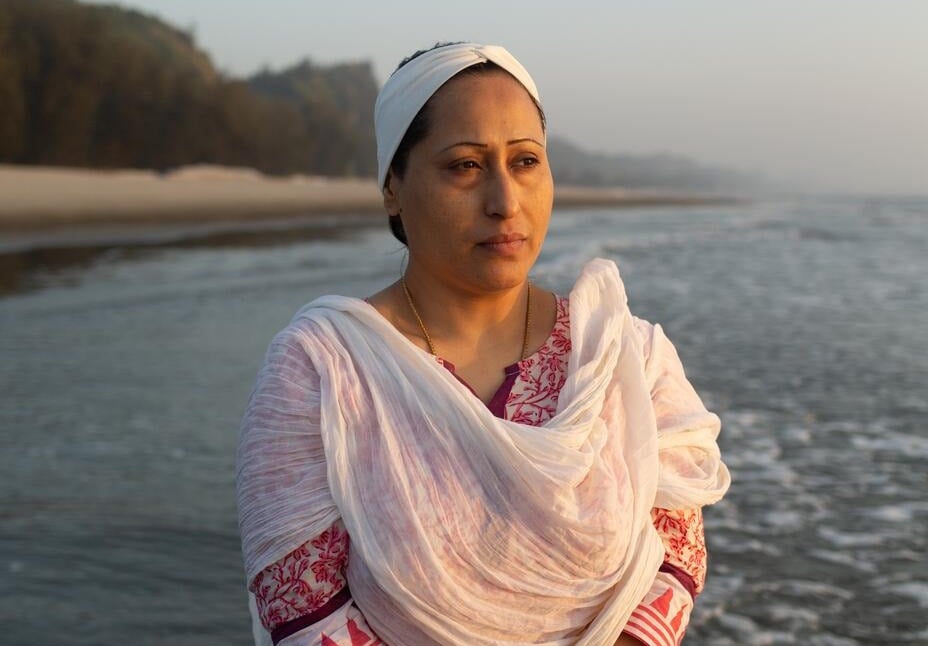“They do not dare to point the finger against a leader who is a symbol of peace”: a conversation with Razia Sultana


Razia Sultana is a Rohingya human rights lawyer and activist playing a significant role in denouncing what the UN called the “hugest genocide of our time.” She protests against Aung San Suu Kyi, a Nobel Prize Laureate who won the Burmese presidential elections in 2016. Our Western narrative has given voice to Suu Kyi, but Razia Sultana’s claims received little coverage.
Media use the power of narrative to deliver a bearable version of reality to the public. We are often merrily unconscious of the filter bubbles in which we live. Algorithms choose on our behalf, and we would unlikely step out of our comfortable narratives. We rely on judgments without shades. To win a Nobel Prize Laureate excludes any allegations about a genocidal intent: we need to believe that Suu Kyi is carrying out a democratic process in Myanmar.
The Burmese Constitution states that the military can take power when an emergency is verified. Suu Kyi intended to change it when she was elected president in 2016. She had the opportunity to change the Constitution with 80% of the parliamentarian approval, yet she did not.
When some members of the Arakan Army (the Rohingya military group) launched an attack on 30 police posts in August 2017, the Burmese military declared an emergency state. Representing the largest Muslim minority in Buddhist Myanmar, the highest Buddhist authorities launched via Facebook a hate campaign against them.
Since August 25, 2017, more than 700.000 Rohingyas are seeking refuge in neighbouring Bangladesh. They are people with no country persecuted like harmful bacteria.
The media play a pivotal role in this tense situation. Facebook’s CEO Mark Zuckerberg was called before a US congressional committee to explain the unmoderated Hate Speech against Rohingyas. Zuckerberg claimed his team was planning improvements for content moderation, but the harm was already done.
Information disorder and the human need to find someone to blame have already shaped a distorted perception of Rohingyas in Myanmar. Buddhist religious authorities keep spreading fake news about Rohingyas, accusing them of being violent foreigners, Muslim terrorists, and illegitimate occupants.
Furthermore, the Rohingyas’ genocide shows how media can promote, obscure, and omit news stories to frame our judgments on the world. In Italy, few news outlets reported the village arson, the mass killings, and the atrocious rapes that the Burmese military committed against Rohingya women, men, and children.
The genocidal intent of the Burmese military includes the assassination of children and men and brutal gang rapes of women. Razia Sultana is a Rohingya human rights lawyer who designed a resilient program to help Rohingya women cope with the physical, psychological, and social consequences of gang rapes.
Burmese soldiers sexually abuse them for many days in a row to make sure they get pregnant and destroy Rohingya’s blood. Razia Sultana works in many Bangladeshi refugee camps with her organization RW Welfare Society (RWWS).
She is building a safety net for traumatized humans who have lost their homes, children, husbands, and parents. She gives back the colorfulness of their traditional dresses to Rohingya women who forgot that life is not a monochromatic palette. She reminds them that they are worthy of love.
She granted me an interview, and her answers destroy the walls we build for the sake of what we assume is our safety. She shows that there are humans rather than monsters on the other part of our barbed wire.
Caterina: Allow me to flatter you a little. You’re a Rohingya woman born in the Rakhine State, northern Myanmar. You moved to Bangladesh for your father’s business when you were a teenager. Then, you went to Law School to become a human rights lawyer. As you saw a massive and unexpected mass of Rohingya coming to Bangladesh in so little time during the last months of twenty-seventeen, you became suspicious, and you started interviewing the refugees in Bangladeshi camps. The majority of the survivors happened to be women, and you discovered mass rape episodes and brutal gang rapes perpetrated by the Burmese military. Again, I use the term rape just because I don’t know a more brutal term to describe what these women are going through.
Today you’re working in the refugee camps, and you reported the numbers and the testimonies of these women in your books Witness of Horror and Rape by Command published by Kaladan Press.
You interviewed survivors who have witnessed mass killings and who have experienced brutal acts such as gang rape. I have read that many women do not speak up about what happened to them for fear of social stigma. Some of them abandon the children born from rape, and they tend to hide their pregnancies from the community. What is the work you intend to promote in the refugee camps to help more Rohingya women denounce what they have experienced?
Razia Sultana: I have been doing my psychosocial resilience program since last year. I target camps where women are not allowed to join any center. I take it as my challenge, and I got my results and respect for my training. Not only do women grow confidence, but the program makes them also secure and safe. Helping and supporting each other is my training object. I also help them overcome the trauma they got in their own homeland and from their own government.
It’s very surprising that Rohingyas don’t know about other members of their community who have been facing the same violence for decades. Some educated people have knowledge about it, but there are very few, so it’s my responsibility to make them aware of the others. We will all have a common enemy, which is Myanmar’s Tatmadaw (military force).
C: During an interview with El Salto Diario last March, you argued that Rohingyas do need firm action from the international community rather than money for the refugee camps. In your opinion, is the UN and the international community doing enough to help Rohingya women?
R: UN’s and other international MSF’s reports stated that more than 12 thousand women had been raped. However, when I got involved in my research, it was an even more horrible situation! I am still finding rape victims and sexual harassment cases, which are never mentioned. The rate of rape victims is even higher, and now male victims are also slowly exposed.
There is too much of a gap between human rights agents and world peace mechanisms; it is obvious. News in the media never tries to find out actually what is going on with many ethnic minorities. They do not dare to point the finger against a leader who is a symbol of peace! They are covering the crime of her own army, which is responsible for all kinds of violence. The world is acting like a democratic environment in Myanmar has been made. But the reality is totally hidden. There is no democracy: it’s just a cover to hide the real military power. There is no power of the NLD (National Democratic League) government. If it is a democracy, how can a ruler not know anything when millions of people are displaced and killed? For their own benefit, the international community believes in peace missions, spending all their efforts on this unsuccessful mission.
Remorse is not that helpful because real matters have already been disclosed. However, they try to ignore it, and with their own wealth and power, they convince some superpower [i.e. China] to promote and support their activities for their own benefit.
First, they should stop doing business and investments in Myanmar. They should also break the power of the chain. Accusing ethnic minorities can’t be continued for humanity, and the greed for power and wealth should not allow any kind of violence against any caste or religion. Myanmar is a country for all minorities, and we should care about developing our relationships.
C: What elements allow you to argue that rape is being used as a systematic weapon of war against the Rohingyas in Myanmar?
R: The way the operation happened clears out that it can’t be an operation for the sovereignty issue. It aims to forcibly displace a community that has been under atrocities for decades; however, no one has focused on Rohingya issues. They just took it as a normal internal issue, and of course, the main international concerns are investments in Myanmar and its natural resources. Ethics is not very much of a concern in front of business! We don’t have to go far. Just think about the 2012 Sittwe riot (conflicts between Buddhists and Muslim Rohingyas), which was not an accident: it happened to clean the area for a pipeline. No one said a single word against this plan, and they forced the people of the land to live and go to the IDP (International Displaced Person) camp.
C: In Rape by Command, you invite Myanmar’s government to take action against brutal crimes such as sexual violence perpetrated by the military force. After the denial of mass rape by the government’s Rakhine Investigative Commission on December 1, 2016, how can you still trust Myanmar’s institutions?
R: I keep hope because Myanmar people need to realize that this is not a real democracy, and if they want a democracy, they have to change the power mechanism by breaking the chain of the military domination rule. I dare to say that if Myanmar gains an actual environment of democracy and proper government, it will become peaceful. All ethnic minorities wish to live in peace, and it’s not only themselves; it’s for everyone.
C: In your opinion, why the Rohingya genocide has received so little coverage in Western newspapers? Do you think that being a Muslim minority uncovers a bias that Western nations have since 9/11?
R: The whole world is now under Islamic phobia, so the Rohingya issues carry this disadvantage, and as Muslims, they are easily targeted. Also, it’s a way to clean the nation because they are accused of being an aggressive and threatening community for their region and own country.
C: Do Rohingyas feel hatred toward Burmese Buddhists?
R: My experience says that if the people of Myanmar get real information about mutual rights, they will connect to each other with respect. Maybe this process will need time, but it’s not impossible. People are trying to survive, and they are facing struggles under many threats because the power doesn’t want to allow Burmese people’s unity.
I believe we all suffer, but we come to one point when we will overcome all challenges. I dream about Union Burma, where people will be judged by humanity, not caste or religion. I realized that if Rohingyas will return to their land, the situation will change by 70%. We would be able to create relationships with other communities who really are not with the Myanmar military, which killed and also tortured their militants.
C: The situation is very tense and dramatic. I want to thank you deeply for your powerful words and for what you are fighting for. As young women and men, we deeply need such positive models of resilience.
Rome, November 2019
This interview appeared in The Matthew student newspaper on March 2, 2020.
Kaladan Press has published Razia Sultana’s books, which can be read freely online.
